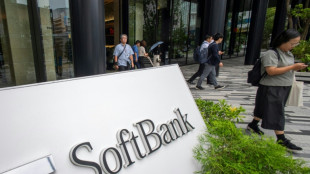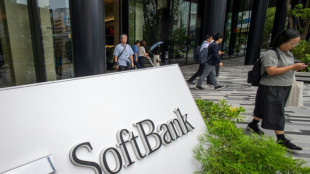
-
 Vance and Lammy talk Gaza, fish as US VP starts UK holiday
Vance and Lammy talk Gaza, fish as US VP starts UK holiday
-
Israel plans to 'take control' of Gaza City, sparking wave of criticism

-
 Putin taps key allies ahead of Trump summit, sanctions deadline
Putin taps key allies ahead of Trump summit, sanctions deadline
-
Two tourists die, fires erupt in Greece amid gale-force winds

-
 Lens sign France international Thauvin from Udinese
Lens sign France international Thauvin from Udinese
-
Gold futures hit record on US tariff shock, stocks wobble

-
 Man Utd training ground upgrade will foster 'winning culture': Ratcliffe
Man Utd training ground upgrade will foster 'winning culture': Ratcliffe
-
Two tourists die at sea in Greece amid gale-force winds

-
 'Optimistic': Champagne growers hope for US tariff shift
'Optimistic': Champagne growers hope for US tariff shift
-
French firefighters optimistic after controlling vast wildfire

-
 Germany suspends arms exports to Israel for use in Gaza
Germany suspends arms exports to Israel for use in Gaza
-
Stocks waver, gold futures hit record on US tariff updates

-
 Guessand says he jumped at chance to join Aston Villa after sealing move
Guessand says he jumped at chance to join Aston Villa after sealing move
-
Israel to 'take control' of Gaza City, sparking wave of criticism

-
 Accumulating bitcoin a risky digital rush by companies?
Accumulating bitcoin a risky digital rush by companies?
-
Liverpool's Slot hints at fresh Isak bid despite 'attacking power'

-
 PSG to sign Lille goalkeeper Lucas Chevalier: source
PSG to sign Lille goalkeeper Lucas Chevalier: source
-
Oil industry presence surges at UN plastic talks: NGOs

-
 Kipyegon says a woman will run a sub-four minute mile
Kipyegon says a woman will run a sub-four minute mile
-
Tokyo soars on trade deal relief as most Asian markets limp into weekend

-
 Israel to 'take control' of Gaza City after approving new war plan
Israel to 'take control' of Gaza City after approving new war plan
-
Australian A-League side Western United stripped of licence

-
 'Back home': family who fled front buried after Kyiv strike
'Back home': family who fled front buried after Kyiv strike
-
Indonesia cracks down on pirate protest flag

-
 Israeli army will 'take control' of Gaza City: PM's office
Israeli army will 'take control' of Gaza City: PM's office
-
Australian mushroom murderer accused of poisoning husband

-
 Coventry's mettle tested by Russian Olympic debate, say former IOC figures
Coventry's mettle tested by Russian Olympic debate, say former IOC figures
-
Library user borrows rare Chinese artwork, returns fakes: US officials

-
 Parisians hot under the collar over A/C in apartments
Parisians hot under the collar over A/C in apartments
-
Crypto group reportedly says it planned sex toy tosses at WNBA games

-
 American Shelton tops Khachanov to win first ATP Masters title in Toronto
American Shelton tops Khachanov to win first ATP Masters title in Toronto
-
Tokyo soars on trade deal relief as Asian markets limp into weekend

-
 New species teem in Cambodia's threatened karst
New species teem in Cambodia's threatened karst
-
Australian mushroom murderer accused of poisoning husband: police

-
 Solid gold, royal missives and Nobel noms: how to win Trump over
Solid gold, royal missives and Nobel noms: how to win Trump over
-
Canadian teen Mboko outlasts Osaka to win WTA Montreal crown

-
 Trump to host Armenia, Azerbaijan for historic 'Peace Signing'
Trump to host Armenia, Azerbaijan for historic 'Peace Signing'
-
Israeli airline's Paris offices daubed with red paint, slogans

-
 US raises bounty on Venezuela's Maduro to $50 mn
US raises bounty on Venezuela's Maduro to $50 mn
-
Lebanon cabinet meets again on Hezbollah disarmament

-
 France's huge wildfire will burn for days: authorities
France's huge wildfire will burn for days: authorities
-
Bolivia right-wing presidential hopeful vows 'radical change'

-
 Trump says would meet Putin without Zelensky sit-down
Trump says would meet Putin without Zelensky sit-down
-
Trump offers data to justify firing of labor stats chief

-
 Bhatia leads by one at PGA St. Jude, Scheffler five adrift
Bhatia leads by one at PGA St. Jude, Scheffler five adrift
-
Disney settles Trump-supporting 'Star Wars' actor lawsuit

-
 Trump moves to kill $7 billion in solar panel grants
Trump moves to kill $7 billion in solar panel grants
-
Venus Williams falls at first hurdle in Cincinnati

-
 Mixed day for global stocks as latest Trump levies take effect
Mixed day for global stocks as latest Trump levies take effect
-
SpaceX agrees to take Italian experiments to Mars

| RBGPF | -5.79% | 71.84 | $ | |
| AZN | -0.89% | 73.4 | $ | |
| CMSC | 0.13% | 22.99 | $ | |
| BTI | 0.69% | 57.085 | $ | |
| RIO | 1.35% | 61.6 | $ | |
| CMSD | -0.13% | 23.49 | $ | |
| NGG | -0.91% | 71.43 | $ | |
| SCS | -0.63% | 15.9 | $ | |
| BP | -0.15% | 34.14 | $ | |
| SCU | 0% | 12.72 | $ | |
| RYCEF | -0.35% | 14.4 | $ | |
| GSK | 0.78% | 37.875 | $ | |
| RELX | -1.93% | 48.13 | $ | |
| BCC | -0.65% | 82.655 | $ | |
| VOD | 1.01% | 11.375 | $ | |
| BCE | 2.8% | 24.465 | $ | |
| JRI | 0.15% | 13.43 | $ |

Facing a broken economy, Ghana's tech-savvy teens turn to fraud
In the dusty alleys of Nima, a shanty town in the heart of Ghana's capital, a 17-year-old called Ghost reclines on a faded plastic chair inside a dimly lit internet cafe.
Outside, barefoot children chase a punctured football. Inside, Ghost's fingers dance across the keyboard, his eyes locked on WhatsApp as he engineers a phishing scam that could earn him thousands of cedis in just a few hours.
"I made GHC12,000 ($770) last month," Ghost told AFP, his voice low and calculated, describing an online store he set up on Instagram.
"People bought phones and laptops. None of it existed."
Ghost, a pseudonym he gave AFP, is one of a growing number of Accra's teenagers turning to cybercrime to survive in a country mired in economic crisis, battling both youth unemployment and broken dreams.
From mobile money fraud to investment scams, a murky digital underworld is sucking in minors, many working from their bedrooms or small kiosks operating in plain sight -- anywhere with a stable internet connection.
- Too good to be true -
Nima’s 441 neighbourhood is a tightly packed, working class community of corrugated iron housing and open drains. Opportunities are scarce -- but mobile phones are not.
Ghana's Cyber Security Authority (CSA) has raised the alarm over a surge in cyberfraud, with financial losses tallying $282,776 between January and March 2025, nearly doubling the $154,241 recorded during the same period in 2024.
Officials warn that youth-led scams, powered by social media and peer pressure, are driving the spike.
Phishing scams, brand impersonation and fake online shops dominate the scene, with teenagers posing on Snapchat and TikTok as vendors with offers that are too good to be true.
Mercy Adumoah, 20, was one such victim.
"I saw a page on Snapchat selling heels. I needed a pair for an event, so I paid without thinking twice," she recounted.
After they received the money, the sellers blocked her account.
Experts say these crimes have become systemic in a country with a battered economy that is still recovering from a 2023 debt default. Inflation shot above 54 percent in 2022 and has remained above 20 percent into 2025.
At a junior high school near Nima, teacher Mohammed Inusah has witnessed a transformation.
"Some of my students have iPhones more expensive than my salary," he told AFP. "They flaunt cash, buy designer clothes and sneakers."
"The parents are either unaware or too afraid to confront them."
- 'I know it's wrong' -
A soft-spoken boy with a mop of dreadlocks who gave the name Tricky said he got his start in scamming by copying scripts from online forums in Nigeria.
Later, his cousin taught him mobile money fraud -- how to pose as an agent from the local telecom company to get access to people's accounts.
Tricky claims his biggest hit since in his two years of scamming was $500 -- twice the monthly salary of a public health nurse or a teacher.
"I bought clothes, helped my mum pay rent," he said. "I know it's wrong, but tell me, what else can I do?"
The CSA has also flagged a dramatic rise in online investment fraud. Between January and August 2024 alone, 149 cases were recorded with losses nearing $128,534.
"I fell for one," admits 18-year-old "Bronzy", who went from victim to perpetrator. "A guy scammed me using a fake forex trading site. So I learnt the game."
He now runs a group on Telegram promising 20 percent weekly returns.
"People invest and I disappear," he said.
Abubakar Issaka, president of the Cyber Security Experts Association of Ghana, said the situation is only getting worse.
"The regulations exist... but enforcement is weak. The number of professionals is not growing fast enough to match the fraud cases," he said.
Tracing perpetrators "is a challenge due to poor data integration" between telecoms operators and the national ID database, he added.
In some cases, the phone numbers used in frauds "belong to people who died years ago. Fraudsters are steps ahead."
- No end in sight -
Victims suffer anxiety and financial ruin. Scammers are not untouched. Ghost admits he's often afraid.
"Sometimes, I can't sleep. I wonder if the police will knock. But when I see my friends living large, I feel like I must keep going."
As dusk settles over Nima, Ghost logs off, pockets his burner phone, and steps into the fading light.
He didn't make any money that day. His world is one of quick, fickle wins and quiet fear. But with Ghana's economy showing no signs of rapid recovery, many more are likely to follow him into the shadows.
strs/nro/cw
C.AbuSway--SF-PST
